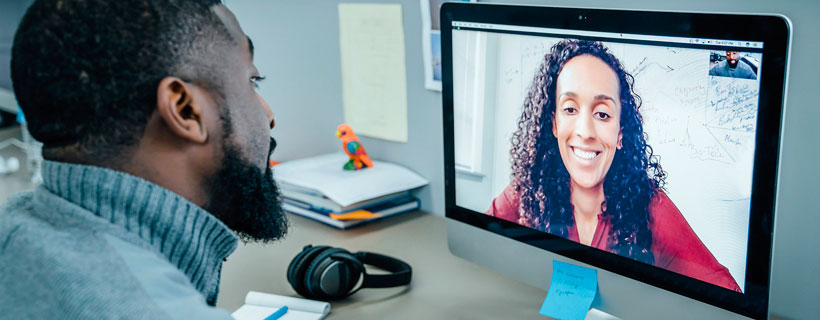How to interview a candidate who will be working remotely full time
The way we work is becoming more flexible each day. The developments in technology and the need for a better work-life balance certainly has had a huge part to play facilitating this trend. In order to find the right people who can deal with the responsibility of remote working, you will have to ask different questions during your job interview than you are used to.

Read time: 3½ minute | By: Hays Marketing
After reading the 3 parts below, you will be able to find the most suitable candidate:
Consider a video interview
By the very nature of how and where they will work, you may never meet the candidate, not even during the interview process.
A video interview makes the conversation more personal. Also allowing you to assess the candidate’s communication skills and body language.
It can also help you to assess how comfortable they are when using technology, which could indicate how effectively they are likely to use it when working with the rest of your team.
Traits of effective remote workers
An article published by Forbes outlines 10 essentail traits that you should be able to identify in the right candidate:
- Someone who values results over process
- A self-starter
- Able to complete a test project
- Both punctual and responsive
- Motivated by something larger than themselves
- A natural problem solver
- Able to demonstrate attention for detail and the ability to track their KPIs
- In possession of a strong, technical aptitude
- Experienced in some form of remote work already
- Focused on growth
9 best questions to ask remote workers
An interview specific for remote workers should be more focused on the candidate's personality than on their knowledge and skills. After all, you must be able to trust the candidate can manage his time effectively and deal with the freedom of working from home. Ask questions that are more focused on goals, experiences, problem-solving skills and communication.
Good questions to ask are:
Do you have experience of working remotely?
This is crucial, as there’s no guarantee that someone without experience will be suited to working this way. If they haven’t, what are their intentions? How does working remotely fit with their goals, and how are they suited to working this way?
What do you like/think you’ll like about working remotely, and what led you to apply for a full-time remote working role?
Here, you’ll be able to ascertain what they value most. It will give you an indication of how thoroughly they have thought through the prospect of working remotely, and how it will complement their working style.
How do you intend to collaborate with colleagues when working remotely? Can you tell me about how you’ve done this in the past?
Their answer here will give you clues as to how much they value collaboration and the skills they have to do this effectively when working remotely.
What has working remotely taught you about how you work most effectively?
The candidate should be able to reflect on what they’ve learned from working remotely, and how it’s helped them to develop. They should be able to tell you, for example, which part of the day are they most productive, or how they have adapted certain skills to working away from others.
Which online collaboration tools do you have experience of using?
It’s important the candidate feels at home when using new technology. They should be able to use their skills and intuition to get themselves accustomed to any new platforms your business may be using, and use these to effectively, and regularly communicate with colleagues.
Do you foresee any challenges with working remotely, and how do you plan to tackle these?
Given the pros and cons of working remotely, they should be able to identify these, and prove that they can anticipate and solve foreseeable problems. For example, one challenge they foresee could be feeling disconnected to the business. In their answer, they should be able explain to you how they would proactively tackle this.
Do you have sufficient office space at home?
This one sound obvious, but it is absolutely crucial that the remote worker is able to work safely, comfortably and productively at home.
How do you deal with miscommunication or conflict, and can you give me an example of doing so?
How calmly and practically the candidate handles conflict could be key to their success in the future when working remotely. As miscommunication can be more common, without face-to-face engagement, they should be able to easily explain to you how they resolve such instances.
How do you get to know new members of your remote team?
How the candidate answers this question indicates how effectively they communicate, engage with others and learn how to work collaboratively, even from a distance. Their answer will also give you a clue as to how highly they value team work and the development of professional relationships.
Getting the right person in the right place now is essential and by approaching the interview in the right way, you’ll stand a good chance of identifying the right people to add to your remote workforce.




